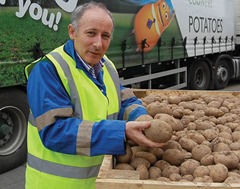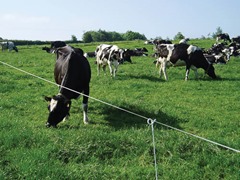Exciting times ahead for agri-food
 Richard Halleron senses a mood of optimism within the food and drink industry but also hears calls for more marketing to promote local produce.
Richard Halleron senses a mood of optimism within the food and drink industry but also hears calls for more marketing to promote local produce.
As the local agri-food sectors settle down to inwardly digest the content of the recently published Agri-Food Strategy Board (AFSB) report, one leading figure within the industry has called for the recommendations to be implemented in a way that reflect the needs of those businesses that specifically supply the home market with fresh produce.
“I am fully aware of just how important export opportunities are for Northern Ireland’s food sector as a whole,” added Wilson’s Country Managing Director Lewis Cunningham (pictured above).
“And I fully support these objectives and recommendations. However, it’s important for the Agri-Food Strategy Board to also recognise the important role which the likes of the potato sector plays within our agri-food economy. In our case, we need support to help further encourage consumers throughout Northern Ireland to ‘buy local’.
“I visit other parts of the United Kingdom and Europe on a regular basis and I am always impressed by the innovative and imaginative marketing campaigns implemented as a means of encouraging consumers in the various regions to support locally produced fresh produce.
“All of these initiatives are, at least, part-funded through the public purse. And, obviously, I think it important that such promotional activities are mirrored here in Northern Ireland.”
Meanwhile, AFSB Chairman Tony O’Neill has told agendaNi that he is expecting a formal response from the Stormont Executive to the organisation’s formal report – ‘Going for Growth’ – during the early autumn period.
“And the omens are looking good,” he stressed. “An inter-departmental steering group has been established to allow all the relevant facets of government to give their considered opinions on our recommendations. This, in turn, should ensure that we get a response that reflects the views of the Executive as a whole.
“I have met with a number of departmental permanent secretaries over recent weeks. And the response to our ideas at that level has been extremely positive and encouraging.”
Tony O’Neill continued: “Significantly, we are also starting to see a response to the report which will have a direct bearing on the activities of local farm businesses. In June, the then Finance Minister Sammy Wilson recommended a £10 million government commitment to the establishment of an Agri-Food Growth Fund, as called for in the AFSB report. Hopefully, we will see additional funding commitments being made over the coming weeks and months.”
The AFSB report envisages growth of
60 per cent being achieved across the entire food and drinks sector over the next seven years. This will lift total annual sales from the current value of £4 billion to £7 billion. Also anticipated is an associated expansion in employment of 15 per cent, up to 115,000.
The strategy board report details targets for each of the individual food sectors. For dairy and redmeat, the growth target up to 2020 has been set at 65 per cent. Where pigmeat is concerned, the comparable figure is 48 per cent with poultry and eggs expected to secure a 70 per cent growth target over the next seven years.
 And Tony O’Neill remains steadfast in his view that the report constitutes a dynamic ‘action plan’ for the future: it is not just a series of sterile recommendations. He commented: “Our aim is to develop supply chain models for the individual sectors and a farm business Improvement scheme linked to the supply chain as a whole. From a structural point of view, we have also recommended the establishment of a single marketing organisation for agri-food in Northern Ireland.
And Tony O’Neill remains steadfast in his view that the report constitutes a dynamic ‘action plan’ for the future: it is not just a series of sterile recommendations. He commented: “Our aim is to develop supply chain models for the individual sectors and a farm business Improvement scheme linked to the supply chain as a whole. From a structural point of view, we have also recommended the establishment of a single marketing organisation for agri-food in Northern Ireland.
“We have already re-constituted our various sectoral working groups and they are re-engaging with the relevant stakeholder bodies at the present time.”
But, as Tony O’Neill went on to point out, the level of total investment required to secure the growth targets envisaged by AFSB remains at £1.3 billion.
He concluded: “We are asking government to come up with £400 million of this figure, either directly or through matched funding measures, which can facilitate the drawing down of EU support measures. Over the coming weeks, we should see if the various government ministers are really up for this challenge.”
Growth trends
Recent figures, published by the Department of Agriculture and Rural Development (DARD), confirm that the total gross turnover of the Northern Ireland food and drinks processing sector is estimated to have increased from £3,985 million in 2011 to £4,154 million in 2012: an increase of 4.2 per cent.
Nine sub-sectors in the food and drinks processing sector experienced an increase in their gross turnover between 2011 and 2012. The largest increases are estimated to have occurred in the beef and sheepmeat (+£103.9 million) and pigmeat (+£46.2 million) sub-sectors, whilst the milk and milk products sub-sector is estimated to have declined (-£28.0 million).
It is estimated that the total number of direct full-time employee equivalents in the food and drinks processing sector increased from 19,628 full-time equivalents in 2011 to 19,778 full-time equivalents in 2012: an increase of 0.8 per cent.
Agriculture and Rural Development Minister Michelle O’Neill welcomed these latest trends which, she believes, highlight the great potential for further growth of the local food and drinks processing sector.
She added: “The agri-food sector recorded continuing growth in both turnover and exports between 2010 and 2011. This is particularly welcome given the current demanding economic climate. The figures demonstrate the important role played by our local food and drinks processing sector and its contribution to the local manufacturing sector and wider regional economy.”
Enterprise Minister Arlene Foster agreed. “The most recent highlight is that our food and drinks processing sector continues to flourish. The increase in both turnover and exports between 2010 and 2011 is very encouraging and demonstrates the resilience of the industry. There continue to be opportunities for growth for businesses that are prepared to seek new markets and I would encourage the sector to optimise all available opportunities to further develop,” she commented.
“The food and drinks processing sector continues to be a major asset to our economy. Over the last year, my department has been working with the Agri-Food Strategy Board, along with leading employers from the sector, to assist in the development of a strategic action plan for the industry [i.e. ‘Going for Growth’]. The targets within the plan reflect the agri-food industry’s ambitions for the sector and I am confident that they can continue to grasp the emerging opportunities available to them and to go from strength to strength in the future.”





